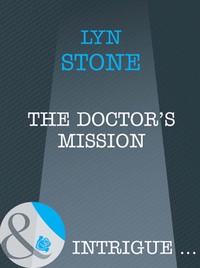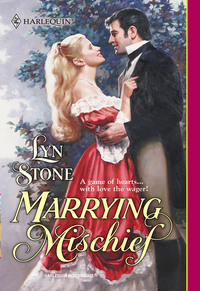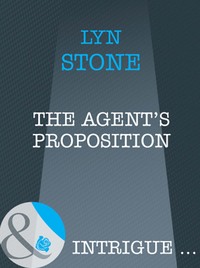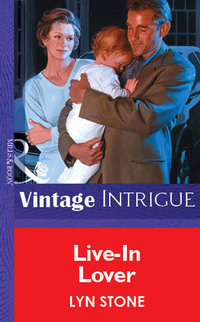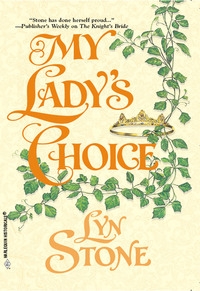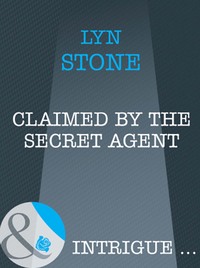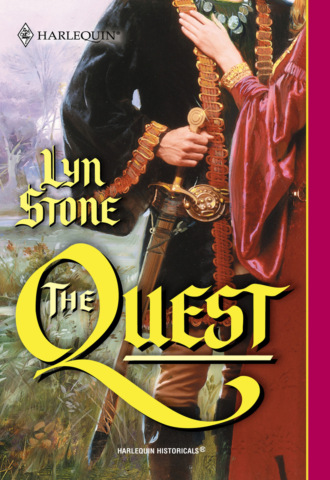
Полная версия
The Quest
She put the jug of that same liquid to his lips and bade him drink deeply. He did so more than once, immediately realizing that it was the Scots’ famous water of life. It burned his throat as viciously as it had his wound. He’d had this stuff before and knew a blessed numbness would follow, a drunkenness from which he might never wake.
“’Twill take a few moments to work upon your senses,” she told him. Then she set the jug aside and took out a needle the length of his smallest finger. To the eye of it, she guided a full ell of thread.
“By the saints,” he muttered. “You’d sew me with pikestaff and rope?”
“Aye, and glad of it you’ll be,” she said, adding ruefully, “but not right soon.”
The languor offered by the spirits began to envelop him in its warm cocoon. The sun was setting now. He could see the last rays of it dancing across the waves. Idly, he wondered if he would ever see it rise again. No matter. “Have your way then, madam.”
His eyes closed of their own accord, though he’d faintly hoped to expire while gazing upon her striking features. He forced them open again to see whether he had imagined her beauty. She looked the same.
Strange to find such a one here in the hinterlands. Though he had seen a good portion of Scotland in his day, he had never come this far to the west. For some reason he had imagined there would be only tall, ruddy maids with wild, matted locks and thick, sturdy limbs. Unruly Viking stock combined with the fierce warring spirit of the Old Ones.
Not this woman. She appeared almost delicate, her movements graceful as those of a nimble hart. Her skin brought to mind fresh cream reflecting firelight. Sparks glinted in the depths of her sin-dark eyes each time her gaze caught his own. If only he could see her hair. Smooth, silken and long enough to reach her waist, he imagined, though she had it properly covered so that he could not even guess its true color. Dark, he thought, because her brows were. How he would love to see her hair, run his fingers through its smoothness. Oh well, he supposed he would soon be past pleasures of the flesh.
He turned his head slightly, and there was Ev, sitting cross-legged beside the fire. In his lap sat a small, thin, ethereal creature with eyes the size of walnuts, peering at him curiously. A child? Where had it come from?
It looked unreal, its eyes old, its mouth frowning, its body nearly wasted away. The sight of it made him want to curl an arm around it and shelter it. As though he had sent that silent message to his squire, Everand did so in his stead. The boy’s act comforted Henri as nothing else could have done at that moment. A fine knight Ev would make one day, he thought yet again.
Henri looked back to the woman, wondering whether he had conjured up both these strangers. The fever fogged his brain, he decided, giving him visions of both hope and despair. The one of hope seemed more real to him, definitely healthier, and he clung to her winsome visage.
He allowed his lids to drop once more, content to hold her image for as long as his mind worked. Drifting into permanent oblivion, entertained by such a vision, possessed great appeal.
Suddenly he jerked and howled, “God’s nails!”
She quickly flinched away from his upraised arm, the needle held aloft in front of her. “You must hold still!” she said firmly.
He followed the taut line of thread and saw it attached to the raw edge of his skin. If he was not dying already, she would surely kill him on the spot.
“I shall hold him down,” he heard Everand say in a deep voice, as though he were a man full grown and oak sturdy.
Henri almost laughed aloud at the idea of small Ev rendering him immobile. Instead, he upended the jug and downed the remainder of the strong brew that promised surcease from his torture. He was already drunk, but not drunk enough.
“Go to,” he gasped to the healer. “Everand will restrain me. He has more strength than his size allows.”
Henri knew he must lie still and bear it without moving, or else Ev would lose face. At least one of them should retain some dignity before their lovely benefactress, and Henri knew he had already forfeited his own.
At long last, she announced, “There, ’tis done.”
Henri tasted blood in his mouth where he had bitten the inside of his cheek. He turned his head and spat as soon as Ev released his arms.
Again, he spied that child of the ether, the one he had imagined before. It sat upon the sand, silently sucking upon one finger, those large, hopelessly sad eyes trained upon him still, weeping inwardly without sound or tears. Was it a shade awaiting the release of his soul?
Never in his life had he wished to faint. Now certainly would be an excellent time for it. Talons of fire gripped him like the sharp, unrelenting claw of a dragon.
The woman pressed a cool, wet cloth to his face and moved it gently as she spoke. “You must sleep now. I shall return anon with a litter and remove you to a place of shelter. Likely ’twill rain before morn.”
“Will I live?” he asked, doubting even she could save anyone so damaged and untended for days. The fever had caught up with him two days ago and raged worse as the hours passed. Now it had him seeing ghost children and thinking death might be welcome, after all.
She did not hesitate in answering him honestly. “Anything is possible. I have done all that I can do. The rest is up to you and God.”
Henri reached for her hand, grasping the long, slender fingers as tightly as he could. “You will not leave us then?”
Indecision marred her brow, then vanished, to leave a look of resignation. “Nay, I will not. Your lad promised me the silver chain in return for my care of you.”
“Alive or dead. That was to be the offer,” Henri bargained, hearing his own words slur. “You will see me to my brother’s home…either way.” When she looked as if she might object, he added, “It is too much silver for so few stitches and a meager taste of spirits. Be fair.”
For a time she considered his words, then she nodded, replaced her implements within their sack and pulled the cord tight to close it. “If you live, I will tend you until you can do for yourself. If you do not recover, I shall wrap you, pack you in clay and transport you to the place you wish to go. Your squire will show me the way, aye?”
Henri heard Ev’s sound of protest and turned to him, though he also spoke for the woman’s information. “Go east and cross the Firth of Clyde. After you pass the hills on the far side, ask directions either to Baincroft or the castle of Trouville.”
“So be it,” she declared, then pulled her hand from his, rose and turned away.
“A moment more, madam,” Henri rasped. “I would know your name.”
She looked over her shoulder and, after a brief hesitation, told him. “Iana…of Ayr.”
“A free woman?” he demanded gruffly, though he would not retract the offer even if she were not. He only needed to know whether they would be followed by some irate laird intent on recapturing his comely healer.
“Free?” she asked, puzzled, as if the word were foreign to her. A light dawned in her eyes, even as he watched. “Aye, I am that,” she said then, “free as a lark. And I fully intend to stay so for as long as I live. I shall see you to this place called Baincroft, and your family will reward me by giving me work to do.”
Trusting that Everand would be in capable hands, Henri surrendered to his fevered dreams.
Chapter Two
Iana instructed the boy to mind Tam for her, and hurried away into the night. She had warned him that his master’s fate rested upon how well he minded the child. His lack of reluctance for the task surprised her and made her feel guilty for the untruth. She hated lying.
It was no lie she had told the knight, however, saying that she was free. This heaven-sent bargain of his had granted her that freedom. He did not need to know how long she had considered herself unfettered, now did he?
Iana felt fairly certain she could keep him alive, and devoutly hoped she would succeed in doing so. The wound was not deep, nor had it festered. However, the loss of blood or fever might well take him yet, unless she dosed him heavily with herbs and kept him warm and dry for several days before attempting to travel.
It certainly would be more advantageous for her if she did not arrive at his brother’s home with a dead body. Besides that, she rather liked the lad, Everand, who doted on his master and was kind to Tam. Iana did not want to see him grieve.
Taking the man to her cottage at the edge of the village was not possible. He might be discovered there. If it became known that she entertained a man within her temporary home, her brother would likely do more than beat her when he found out. And if they remained there until the knight was fit to travel, it would be time for Newell to come for her answer. They had but three days to get well away.
’Twould be best if they repaired to a nearby cave. She knew of one that would suffice. It was where she had planned to go with Tam and hide from her brother until he gave up searching. Getting the knight there would be the problem. He could not walk and she had no beast for him to ride. Her only recourse was to obtain one somehow.
Or why not three? She’d pay no more dearly for them than for a single animal if she were caught. Hanged was hanged. Besides, she did not fancy trudging the breadth of Scotland with Tam on her back, dragging the knight on a litter with only the help of a lad.
The nearest village to Whitethistle stood at least two leagues distant. She knew it well, for it rested upon the estate of her dead husband, the demented old lout who had never given her anything before he died other than two years of abject misery.
His family had taken all of her jewelry from her and kept her dowry as well, so surely his cursed sons by his first wife owed Iana something for enduring their father without complaint. There should be at least three mounts enclosed in a stable somewhere thereabout.
Iana lifted her skirts and quickened her pace. If she was to become a reiver tonight, then she had best be about the business of it before good sense took hold.
Henri opened his eyes to total darkness. There were no stars above him. No moon. Nothing. For a moment, he believed death had claimed all but his awareness and the ever-present pain. He sensed he was enclosed somehow, not out in the open. Then he heard Everand’s almost inaudible snoring nearby, interspersed with the distant, soft whuffle of a horse. Was this a stable?
“Ev?” he whispered.
A cool hand brushed his brow. The woman. He drew in her scent, that of sweet grasses and the underlying essence that marked her gender. “Where are we?” he asked.
“In a cave,” she answered, her voice dulcet and comforting. She placed something to his lips. “Chew upon this. It will aid your rest and cool your fever.”
He accepted it and tasted green bark. Foul stuff, but given that she had sewn him up and rescued him from the elements, he granted her that modicum of trust. Henri chewed for a few moments, then removed the bitter residue from his mouth.
“We leave here come morning,” he told her.
“So eager,” she commented with a soft laugh. “I fear it will be at least another day before you are well enough to ride, good sir.”
“I have sailed the entire length of England in worse condition. I daresay a few days on horseback will not prove any more life-threatening.”
“As you will, then,” she replied softly. “But now you must sleep, sir.”
“Henri,” he whispered, groping about for her hand until he found it and threaded his fingers through hers. It helped to feel grounded here in this dark place, so he would not go flying off into the beyond. The feeling of hanging suspended in purgatory when he’d awakened must have affected him more than he realized. “My name is Henri.”
He realized he must be more fevered than he thought, to invite this informality with a woman. Even his mistresses did not address him so, and he had never before encouraged such a thing. However, she thought him but a simple knight, apparently. That made sense, for when they had set out upon their voyage, he had instructed Everand not to call him “lord.” Most of the time Henri preferred the simplicity of being a knight among other knights, instead of the heir to the Trouville dynasty. It afforded him more friendship and camaraderie. He definitely wished a friendship with this woman, he thought with an inner smile.
“I am Iana,” she said.
“I remember. Iana,” he added, for no reason but to say it, tasting her name on his tongue. Like honey, it sweetened the bitter taste of the bark. “Your father is called Ian, I would wager.”
“My grandfather,” she replied. He could hear the smile in her voice.
“I know an Ian,” he told her idly, his words slurring as his mind grew heavy with fatigue. “A rogue, he is.”
Again, she laughed, a mere flutter of sound that soothed him immeasurably. “Rest now…Henri,” she advised softly.
The sharpness of his aches had subsided. The coolness of her palm seemed to draw the heat from him. “Magic,” he commented, smiling into the dark.
He listened, imagining he could hear her heart beating a steady rhythm, or mayhaps it was his own. A horse whuffled again and Ev made a sleepy sound of protest, likely in response to a dream. For the first time in weeks, Henri felt safe enough and well enough that he could willingly embrace sleep without thinking of death.
“These are your horses, lady?” Everand demanded. He stroked the neck of the smallest mount, a mare who tended to nip.
She shrugged. “They are now.”
He grinned impishly, showing fine white teeth and dimples. “You stole them, did you not? I knew it last night when you returned after so many hours. Did you kill someone for them?”
“Of course,” she said, then wrinkled her nose at him in jest. Iana held tightly to the rope attached to the large cob, allowing only enough slack for the horse to bend its neck and drink from the stream. “In truth, I left a link of the silver for payment.”
With her free hand, she patted the knight’s chain, coiled within the sack attached to her belt, and took pleasure in the clinking. “When the moment arrived to take the beasts, I found I could not become a thief.”
“Aha,” he acknowledged with a sage expression. “An honorable soul. I do admire that in a woman.”
The lad’s sudden transformations from child to jaded gentleman and back again amused Iana. ’Twas hard not to laugh at his pretentiousness. “How old are you, Everand?”
“Fourteen summers. And you, lady?”
She did laugh then, but answered him honestly. “You should not ask such of a woman. I am two and twenty.”
He looked aghast. “I swear by the saints, I would have guessed not more than ten and seven. How well you wear your years!”
Iana could not contain her mirth. “An accomplished flatterer. I do admire that in a man,” she declared, giving him back his compliment. “Now come, we must get these mounts back inside that cave ere someone happens along and sees us with them. I should not enjoy swinging from a gibbet!”
“But you paid more than their worth,” he argued. “What is to fear?”
She turned to lead the cob and the roan back to their hiding place. “Aye, but I did not strike a deal with their owners. It may be they were not willing to sell. Now hurry along, your master will be waking soon and wonder where we are.”
Everand paused to fill the wooden bucket Iana had appropriated from the stables where she gleaned the horses. Hauling that with one hand and leading the mare with the other, he followed her.
“Two and twenty, eh? You said you have no husband. Have you never wished to marry, lady?” he asked as they walked. Though he had had the care of Tam the night before, he still avoided mentioning the existence of the child, who now lay nestled against Iana’s back.
“No, I never wished to wed, but I did so all the same,” she answered curtly, unwilling to lie to the boy, but also disinclined to share her tale of woe. If he and his master knew the entire story and the plans her brother now had for her, they might well leave her behind to avoid trouble. “My husband perished last year, and I will speak no more of him.”
“Aha,” the lad said, “so this is how you became impoverished. Poor lady. You should marry again, this time to one who would have a care to provide for your future. And that of your child,” he added, commenting for the first time on Tam’s presence. Iana supposed the fact that he now thought the bairn had a father made her acceptable enough to mention.
“’Tis none of your affair,” she snapped. “Be silent ere I box your ears.”
“Ooh, a woman with pluck,” he crooned in that too-adult voice of his. “I also like that about you.”
The impudent little nodcock. Iana was still shaking her head when they arrived back at the cave.
She had chosen well their place of concealment. The hollow extended deeply into the side of the hill, its opening a crevice barely wide enough to squeeze the mounts through. The interior widened to a cavity nearly the size of her small cottage, offering plenty of room to house the horses. Through another narrow passage there lay a chamber half the size of the first, but still adequate for her, Tam, the lad and his master to sleep without crowding each other.
She had dared not build a fire inside. If there existed an opening for the smoke to waft out, it might be spotted. If not, they would surely choke on it.
The only light within their sleeping chamber was a small oil lamp that she had brought from the cottage. How she would replace the oil when it burned away, Iana did not know. She had left it burning, half-full, so that the knight—Henri, she recalled—would not awaken in darkness while they were gone.
“Water, berries and dry oats,” she announced to Everand and the man, who had dragged himself up to sit against the wall of the cave. “That must do for today.”
The knight’s gaze immediately locked upon Tam, whom Iana could feel peeking over her right shoulder. He said nothing about the child, but looked somehow relieved and puzzled and disappointed all at once. Shifting slightly, she felt Tam curl into a ball against her back, hiding herself.
“Why can we not buy food?” the squire demanded, plopping down beside his liege. “You have the silver. Your village is nearby.”
Iana sighed. How could she explain why they must remain hidden without giving them the real reasons? If she were indeed a free woman, what was to stop her from adequately provisioning them for the trip and setting out upon it without this subterfuge?
The knight’s bargain was that she deliver him to Baincroft in return for the silver. If they did not want to trouble themselves with a runaway lady whose brother might be offended enough to punish them if they were caught together, she would be forced to relinquish what was left of the valuable chain, and remain behind. Newell surely would find her then, she would be wed and Tam would likely die when taken away from her.
Iana busied herself apportioning the food as she considered whether she should lie. She could sell the horses and go her own way. But no doubt the owners would be looking for them, expecting the one who took them to try to sell or barter them somewhere. Women did not make such trades or sales. She would be conspicuous, and therefore remembered.
Newell would track her that way as surely as if she left a trail apurpose. No, she must remain with this knight and squire, travel with them for her own protection, and do so in secret. Her brother would be searching for a woman alone.
They both watched her, waiting for her to answer. A half-truth, then, she decided, a play upon their knightly inclinations to protect the weak.
“There is this cruel man who wishes me to marry. If I simply disappear, mayhaps he will forget I exist. However, if he hears that I have acquired silver, the greedy fool might chase me to the ends of the earth.” Her brother might do that anyway.
And Douglas Sturrock might, as well. She still did not know what Newell had promised the man to make him consider the match. Her youth and beauty were gone now, and Duncan had left her nothing, not even her dower lands.
Neither knight nor squire said a word. They merely watched her as though waiting for her to continue.
“This is why I brought you here instead of to my cottage,” she added. “This man would see your presence there as a challenge. I do not wish to be taken by force and made wife to a man who would mistreat me and this child. Nor would I wish you harmed on my account. So we must hide.”
The one called Henri stirred slightly, resettling to make himself more comfortable, she supposed. His measured words surprised her. “This fellow you speak of has not forced you to it yet. And I know the law here prevents wedding a woman against her will.”
“Aye, true enough,” she replied. “But there are many ways to bend one’s will, especially a woman’s.”
“Some men are not kind to their wives, that is true.” He seemed to consider that before he asked, “But why would you worry for the child? Surely this man would not risk the wrath of your husband’s family by harming it. A clan war is nothing to court, so I understand.”
“The child is not of my husband,” she answered, offering no explanation.
“Ah, I see.” He cleared his throat and seemed at a loss for words after that.
The boy spoke instead. “Whose child is she?”
Iana pressed her lips together and looked away. Then she declared defiantly, “Thomasina is mine.”
“What would you have done had we not arrived and given you means to hie yourself away?” the knight asked her.
There was a very good question. Iana shrugged and grimaced. “Eventually surrender, I suppose.”
The lad laughed gleefully and slapped his upraised knee. “Ha! When the snakes return to Eire.”
“What mean you by that, Ev?” the knight demanded.
Everand turned to his master and explained in a condescending voice as he shoved his upraised palm in her direction. “Here stands a woman who has buried one husband, endured living in a hovel among peasants, and breached propriety by sleeping in the wild with two men. She also stole away three mounts from sleeping villagers. You believe such a brave spirit would lie down for some sluggard without stones enough to have taken her already?” He crossed his skinny arms over his chest and tossed her a wink, then added sagely, “I think not.”
Iana saw the knight bite back a smile. “Two men in the wild?” he repeated. “I would say that alone qualifies her as most daring. As you say, it appears she has spirit. Now eat your berries, Ev, and govern that mind and tongue of yours.”
The lad readily obeyed, wearing the smug expression of one who had divined all the answers necessary when no one else present was wise enough to do so.
“You seem much better, sir,” Iana observed, desperate to change the topic of their discussion. “How fares the wound?”
He lightly touched the wrapping, which remained free of new blood. “Painful, but healing, no doubt. I feel much stronger after sleeping for so long. Again, I thank you for your care and for agreeing to accompany us.”
She measured out the oats into her metal pan and added water to soak them soft. “I shall need more than the silver as reward for tending you on your journey,” she dared tell him.
His narrowed eyes warned her against greed, though she did not think what she would ask counted as that.
“I will require employment in this new place. You must speak for my skills with this lord of Baincroft who is your brother.”
“In all truth, we have no blood tie, save that we share a half sister. Our widowed parents wed when we were but lads. So we have a bond forged early that is as unbreakable as true kinship. Robert will make a home for you and the babe at Baincroft if that is your wish.”
If they could only reach the other side of Scotland, all would be well, Iana thought. Newell would never think to look for her so far afield. But the chain’s rich links would not last forever. “I must have your promise of this work, sir, for I shall have no other means of income once the silver you gave me has been used up.”


